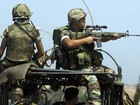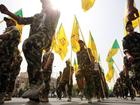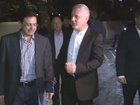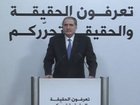Spotlight
Britain and Canada signed on Wednesday a Memorandum of Understanding to increase assistance to the Lebanese army against rising terrorist threats.
“I am very pleased to welcome Canada’s partnership in standing by Lebanon’s stability and security. The MOU secures an additional $500,000 for the Land Border Regiments Project, which supports Lebanese soldiers tasked with securing and protecting Lebanon’s borders from the Syrian overspill,” British Ambassador Designate Hugo Shorter said.
 Full Story
Full Story
The Council of Maronite Bishops expressed concern on Wednesday over the the rising tension among Lebanon's political foes, accusing them of holding the state's decision-making “captive.”
“Dangerous practices and rhetoric … which are influenced by the sectarian tension in the region … are a sign that the state is shattered,” the bishops said in a statement.
 Full Story
Full Story
The Gulf Cooperation Council decided on Wednesday to consider Hizbullah a “terrorist organization,” a day after Sayyed Hassan Nasrallah accused Saudi Arabia of pressuring Lebanon to silence his party.
The six-member GCC took the action against Hizbullah members because of "hostile actions of the militia who recruit the young people (of the Gulf) for terrorist acts," the bloc's Secretary General Abdullatif al-Zayani said in a statement.
 Full Story
Full Story
Speaker Nabih Berri and al-Mustaqbal chief Saad Hariri have stressed their commitment to the dialogue between Hizbullah and al-Mustaqbal movement, informed sources said Wednesday.
Berri and Hariri held a meeting in Ain el-Tineh on Monday. But the sources spoke to several dailies published on Wednesday, saying they agreed not to stop the Hizbullah-Mustaqbal dialogue despite growing tension as a result of Saudi pressure.
 Full Story
Full Story
Israel has begun delivering its new mid-range missile defense system to air bases to defend itself against possible attacks from Hizbullah.
The Defense Ministry said Tuesday the David's Sling system "will allow Israel to more effectively defend against the wide range of current and future threats to its civilians." The delivery process will take a few weeks.
 Full Story
Full Story
Marada Movement chief MP Suleiman Franjieh announced Tuesday that he will next attend a presidential election session scheduled for Wednesday because his presence might further “complicate” the presidential deadlock.
 Full Story
Full Story
Hizbullah chief Sayyed Hassan Nasrallah reassured the Lebanese on Tuesday that the country is not “on the brink of civil war” despite the political and sectarian tensions, as he vowed to continue his criticism of the Saudi policies in Lebanon and the region.
“Since the announcement of the suspension of the Saudi grants, we have entered a new phase of political conflict and Saudi Arabia aggravated it through media campaigns,” said Nasrallah in a televised speech addressing the latest developments.
 Full Story
Full Story
Defense Minister Samir Moqbel on Tuesday approved a recommendation to appoint Brig. Gen. Camille Daher as military intelligence chief to replace Brig. Gen. Edmond Fadel, state-run National News Agency reported.
The proposal to name Daher was submitted to the minister by the army's six-member Military Council, NNA said.
 Full Story
Full Story
The Change and Reform parliamentary bloc on Tuesday accused certain parties of “maneuvering” in order to block the election of what it described as a “strong president.”
“All maneuvers have ended with failure and those who are trying to block any breakthrough do not want a strong president in line with the democratic standards and the National Pact,” said the bloc in a statement issued after its weekly meeting, in remarks about Wednesday's presidential election session.
 Full Story
Full Story
Former premier Saad Hariri announced Tuesday that the Hizbullah-Mustaqbal bilateral dialogue “will continue” despite the recent tensions in the country, as he called on Marada Movement chief MP Suleiman Franjieh to attend Wednesday's presidential election session.
“We will attend tomorrow's presidential election session and I believe that the election of a president is the key to resolving all problems,” said Hariri after talks at the Grand Serail with Prime Minister Tammam Salam.
 Full Story
Full Story




